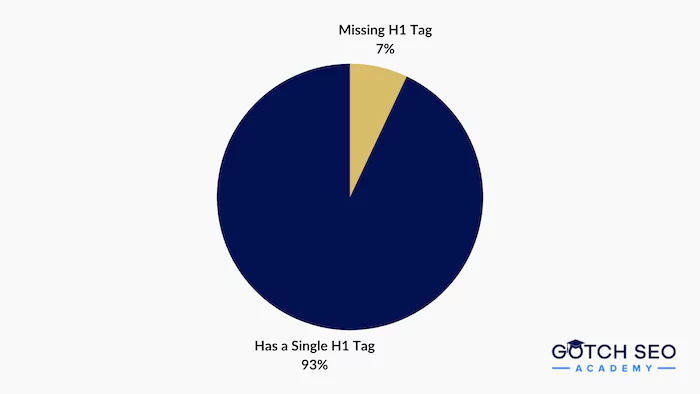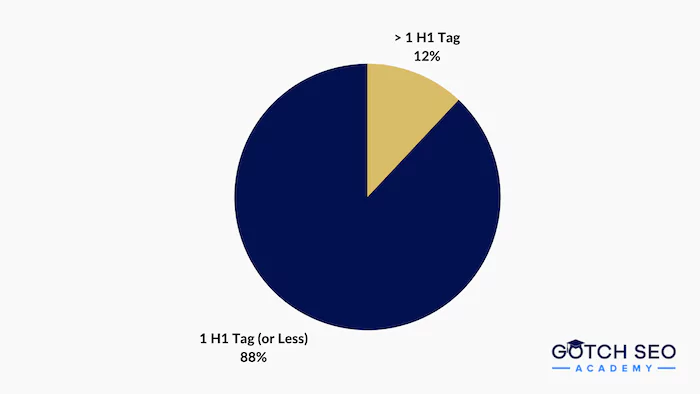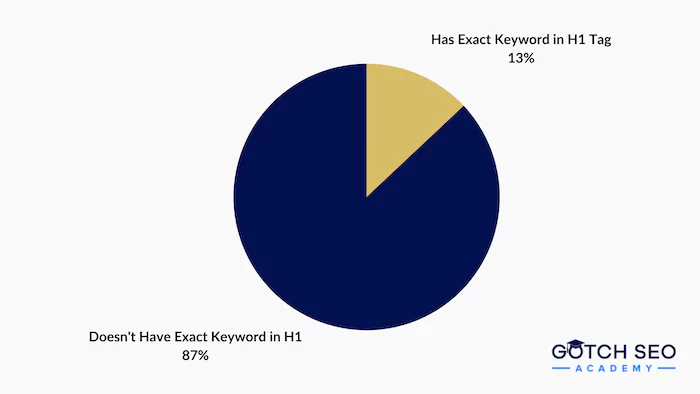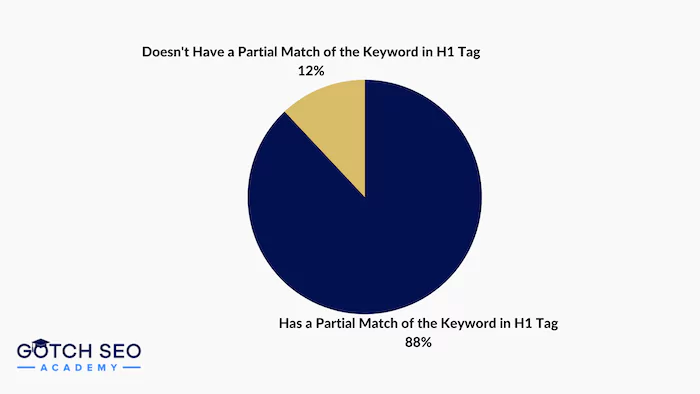Are H1 Tags a Google Ranking Factor?
Quick Answer
Yes, H1 tags are a Google ranking factor, but they are not as important as they used to be. In the early days of SEO, people would stuff their H1 tags with keywords to rank higher in search results. However, Google has since become more sophisticated and can now better understand the content of a page without relying too heavily on H1 tags.
The Influence of H1 Tags on Google Rankings
Our 2026 case study analyzed the correlation between various H1 tag practices and their impact on Google search rankings.
Study Methodology
- Objective: Determine the correlation between various H1 tag practices and their impact on Google search rankings.
- Data Source: A dataset comprising five different keyword sets, analyzing the top 40 Google search results for each keyword set.
Key Metrics Analyzed:
- Presence of a single H1 tag.
- Presence of multiple H1 tags.
- Inclusion of the exact keyword phrase in the H1 tag.
- Inclusion of a partial match of the keyword phrase in the H1 tag.
93.5% of results have a single H1 tag
A weak negative correlation (−0.1172) was observed between rank and the presence of a single H1 tag, suggesting that having just one H1 tag is more common among higher-ranking pages (1-10) than lower-ranking ones (31-40).

However, there are a couple of nuances to consider:
- Correlation vs. Causation: Just because top-ranking pages have H1 tags doesn't necessarily mean that the H1 tag caused them to rank well. It might be a correlation without direct causation. For instance, well-designed sites might include H1 tags because it's a best practice, and they might also rank well because they follow other best practices.
- Threshold Effect: If almost every page (not just the top-ranking ones) across the web uses H1 tags, then its absence might be more of a negative signal than its presence is a positive one. In other words, not having an H1 tag might harm SEO more than having one helps.
If 90% + of top-ranking pages have H1 tags, it's a strong signal that any site serious about SEO should include them. Even if they're not a direct ranking factor, they're part of a collection of best practices that top-ranking sites follow.
12.5% of results have more than one H1 tag
A moderate positive correlation (0.3078) was found between rank and pages with more than one H1 tag. This suggests that the likelihood of encountering pages with multiple H1 tags increases as one moves towards higher rankings.

However, this doesn't necessarily mean having multiple H1 tags benefits SEO. It simply indicates a trend in the data.
There are a few ways to interpret this:
- Coincidence or Other Factors: Multiple H1 tags are a characteristic of specific content types or industries that rank well for other reasons.
- Content Structure: Some modern web design frameworks and content management systems allow for multiple H1 tags in different sections or components of a page, especially in single-page applications or modular content designs. These might rank well due to other associated modern practices, not necessarily because of the multiple H1 tags.
- Not Harmful, but Not Necessarily Beneficial: Multiple H1 tags might not harm SEO but might not significantly boost rankings.
Given the correlation value and considering the nuances of SEO, it's hard to definitively state that there's no benefit to having more than one H1. However, the data does suggest that a single H1 tag is more common among top-ranking pages, and multiple H1 tags aren't necessarily a strong predictor of higher rankings.
13.5% of results have the exact keyword phrase in the H1 tag
A weak negative correlation (−0.2670) was identified between rank and the exact keyword phrase's presence in the H1 tag. This suggests that higher-ranking pages are slightly less likely to have the exact keyword phrase in the H1 tag.

However, it's essential to keep a few points in mind:
- SEO Complexity: Rankings are determined by a combination of many factors, and the exact keyword match in the H1 tag is just one of them. While it might not show a strong correlation in this dataset, it could still be a beneficial practice in conjunction with other optimization strategies.
- Context Matters: An exact keyword match might only be as relevant if the content provides value and aligns with the search intent. Google's algorithms have evolved to prioritize content quality, relevance, and user experience over keyword stuffing or exact matches.
- Variability by Keyword: Some keywords or niches benefit more from exact matches than others. The dataset provides an aggregate view across multiple keyword sets, so there might be nuances at the individual keyword level.
Based on this data, using the exact keyword phrase in the H1 isn't strongly correlated with better SEO performance. Creating high-quality, relevant content that meets users' needs is essential, rather than just optimizing for exact keyword matches.
88.5% of results partially match the keyword phrase in the H1 tag
A negligible correlation (−0.0282) was found between rank and a partial keyword match in the H1 tag, indicating that this factor doesn't significantly influence rankings based on the dataset.

However, considering the practical perspective:
- Natural Language: Partial matches often occur naturally when creating descriptive, user-friendly H1 tags that align with the page's content and the user's search intent.
- User Experience: Partial matches can provide a better user experience by creating H1 tags that are readable and contextually relevant rather than overly optimized.
- Semantic Understanding: Google's algorithms have become increasingly sophisticated in understanding the semantic meaning of content, so partial matches can still convey relevance.
Best Practices for H1 Tags in 2026
Based on our research findings, here are the recommended best practices:
Use One Primary H1 Tag
Follow the 93.5% of successful sites by using a single, descriptive H1 tag that clearly indicates the page's main topic.
Focus on User Intent Over Exact Keywords
Rather than forcing exact keyword matches, create H1 tags that naturally address what users are searching for and what your page delivers.
Write Descriptive, Natural Headlines
Craft H1 tags that serve users first, search engines second. Natural partial keyword inclusion often works better than forced exact matches.
Maintain Consistency with Page Content
Ensure your H1 tag accurately represents the page's content and aligns with the value you're providing to visitors.
Consider Multiple H1s Carefully
While 12.5% of successful pages use multiple H1 tags, this is typically due to modern frameworks or specific content structures rather than SEO strategy.
